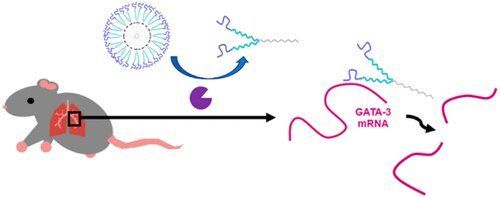Steroid-based inhalers deliver life-saving medication for millions of asthma sufferers, providing relief and the ability to simply breathe. Unfortunately, inhalers do not work for all patients, and with rates on the rise for a disease that leads to hundreds of thousands of deaths world-wide each year, new asthma treatments and strategies are needed.
A team of UConn researchers—including Assistant Professor of Chemistry in the College of Liberal Arts and Sciences Jessica Rouge and Associate Professor of Pathobiology in the College of Agriculture, Health, and Natural Resources Steven Szczepanek—are collaborating to develop novel asthma therapeutics using gene-silencing nanocapsules in a bid to help patients who aren’t benefiting from existing treatments. Their research was published in ACS Nano.
“When treating asthma, many people think of small molecule anti-inflammatory medications as the way to go, but there are plenty of patients who have asthma who do not respond to corticosteroids,” says Rouge. “There’s an unmet need for creating different therapeutics that can suppress asthma for this group of people.”
